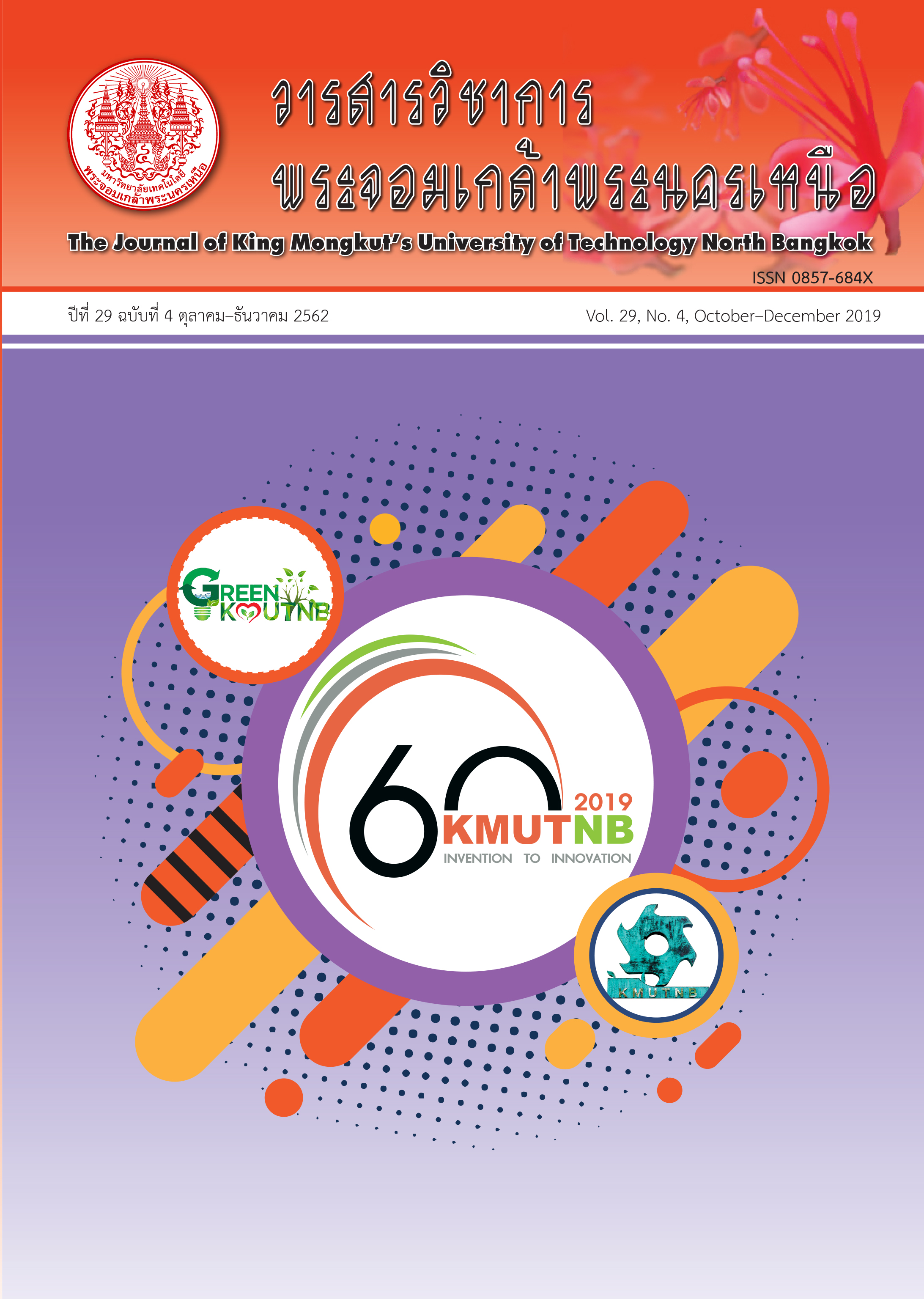แนวทางการพัฒนาทรัพยากรมนุษย์แบบโมโนซุคุริเพื่อรองรับไทยแลนด์ 4.0 ของวิสาหกิจขนาดกลางและขนาดย่อม
Main Article Content
บทคัดย่อ
การวิจัยครั้งนี้มีวัตถุประสงค์ เพื่อศึกษาแนวทางการพัฒนาทรัพยากรมนุษย์แบบโมโนซุคุริเพื่อรองรับไทยแลนด์ 4.0 ของSMEs โดยใช้วิธีการตามระเบียบวิธีการวิจัยและพัฒนา กลุ่มตัวอย่างที่ใช้ในการวิจัย คือ ผู้ประกอบการวิสาหกิจขนาดกลางและขนาดย่อมของประเทศไทยที่จดทะเบียน จำนวน 400 คน เครื่องมือที่ใช้ในการวิจัย ได้แก่ แบบสอบถาม ผลการวิจัยสรุปได้ดังนี้ ขั้นตอนที่ 1 การสัมภาษณ์เชิงลึกเกี่ยวกับแนวทางการพัฒนาทรัพยากรมนุษย์แบบโมโนซุคุริเพื่อรองรับไทยแลนด์ 4.0 ของ SMEs จากกลุ่มเป้าหมายที่ 1 พบว่า สมรรถนะตามวิถีวัฒนธรรมการทำงานแบบญี่ปุ่นประกอบด้วย 21 ด้าน คือ 1) การปรับปรุงอย่างต่อเนื่อง 2) การสร้างบุคลากร 3) ทักษะ เทคโนโลยี และวิทยาการต่างๆ 4) คุณภาพสินค้าและบริการ5) ความคิดสร้างสรรค์ 6) ราคาและต้นทุน 7) ความพึงพอใจของลูกค้า 8) สร้างความสามารถในการแข่งขัน 9) การส่งมอบการกระจายสินค้า 10) ลดความสูญเปล่า 11) ประสบการณ์และองค์ความรู้ 12) สิ่งแวดล้อมและความปลอดภัย 13) ทัศนคติและจิตวิญญาณในการทำงาน 14) กระบวนการ หรือผลิตภัณฑ์ต้นแบบ 15) 2 ส. (สะสาง สะดวก) 16) ห่วงโซ่กระบวนการการผลิต 17) รอบเวลาการทำงาน 18) 7M 19) ประสิทธิภาพของเครื่องจักร 20) ทักษะทางด้านวิศวกรรม และ 21) ผู้ร่วมธุรกิจ ชุมชนและสังคม ความพร้อมในการรองรับธุรกิจอุตสาหกรรม 4.0 ของ SMEs ประกอบด้วย 6 ด้าน คือ 1) กลยุทธ์และการจัดองค์การ 2) โรงงานอัจฉริยะ 3) การดำเนินงานหรือการผลิตอัจฉริยะ 4) ผลิตภัณฑ์อัจฉริยะ 5) การบริการขับเคลื่อนข้อมูล และ 6) พนักงาน ขั้นตอนที่ 2 การสำรวจความคิดเห็นเกี่ยวกับการพัฒนาทรัพยากรมนุษย์แบบโมโนซุคุริเพื่อรองรับไทยแลนด์ 4.0 ของ SMEs พบว่า สภาพการณ์ปัจจุบันและความต้องการจำเป็นในการพัฒนาทรัพยากรมนุษย์แบบโมโนซุคุริของ SMEs ได้แก่ 1) การเสริมสร้างความรู้ ทักษะ ทัศนคติ ทางด้านวิศวกรรมให้พนักงานอย่างสม่ำเสมอ 2) การส่งเสริมการบริหารจัดการแบบ 7M ได้แก่ ทรัพยากรมนุษย์ งบประมาณ วัสดุ วิธีการ การตลาด เครื่องจักร และขวัญกำลังใจ 3) ส่งเสริมการให้ความรู้ด้านห่วงโซ่อุปทาน เช่น การส่งมอบ และการกระจายสินค้าให้มีประสิทธิภาพ 4) การพัฒนาบุคลากร ให้มีศักยภาพในการดำเนินงาน และ 5) การวางแผนรอบเวลาการทำงานของพนักงานได้อย่างเหมาะสมและเกิดคุณภาพสูงสุด ความสำเร็จของ SMEs ไทย ด้านกลยุทธ์และการจัดการเพื่อรองรับไทยแลนด์ 4.0 ได้แก่ “การวิเคราะห์การลงทุนเพื่อสร้างความพร้อมของบริษัทให้เข้าสู่อุตสาหกรรมในยุคไทยแลนด์ 4.0” ด้านโรงงานอัจฉริยะ ได้แก่ “การใช้ระบบเทคโนโลยีสารสนเทศช่วยในการดำเนินงานภายในโรงงาน” ด้านการดำเนินงานหรือการผลิตอัจฉริยะ ได้แก่ “การดำเนินงานโดยใช้เทคโนโลยีมาช่วยทำให้การดำเนินการขององค์กรสะดวกขึ้น เช่น การลดของเสีย ลดเวลา” และ “การสนับสนุนการนำระบบบูรณาการระหว่างเครื่องจักรกับเครื่องจักรมาใช้เพื่อสร้างความสามารถในการลดต้นทุนลงได้” ด้านผลิตภัณฑ์อัจฉริยะ ได้แก่ “การผลิตผลิตภัณฑ์ที่สามารถวิเคราะห์ข้อมูลของวงจรชีวิตของผลิตภัณฑ์ เช่น การใช้ QR Code” ด้านการบริการขับเคลื่อนข้อมูล ได้แก่ “การบริการขับเคลื่อนข้อมูล เพื่อเชื่อมโยงผลิตภัณฑ์ การผลิตหรือการบริการ และลูกค้าเข้าด้วยกัน” ด้านพนักงานได้แก่ “การกำหนดชุดทักษะพนักงาน ไว้ให้สอดคล้องกับนโยบายไทยแลนด์ 4.0” ขั้นตอนที่ 3 การจัดสัมมนากลุ่ม พบว่าการประเมินความคิดเห็นของผู้เชี่ยวชาญเกี่ยวกับการพัฒนาทรัพยากรมนุษย์แบบโมโนซุคุริเพื่อรองรับไทยแลนด์ 4.0 มีความสอดคล้องกันทุกรายการ กับผลการวิจัยจากขั้นตอนที่ 1 การสัมภาษณ์เชิงลึก และขั้นตอนที่ 2 การสำรวจความคิดเห็นเกี่ยวกับการพัฒนาทรัพยากรมนุษย์แบบโมโนซุคุริเพื่อรองรับไทยแลนด์ 4.0 ของ SMEs
Article Details
บทความที่ลงตีพิมพ์เป็นข้อคิดเห็นของผู้เขียนเท่านั้น
ผู้เขียนจะต้องเป็นผู้รับผิดชอบต่อผลทางกฎหมายใดๆ ที่อาจเกิดขึ้นจากบทความนั้น
เอกสารอ้างอิง
[2] S. P. Robbins and T. A. Judge, Organizational Behavior, 14th ed. NJ : Prentice Hall, 2011.
[3] B. Rotarayanont, Monozukuri Human Resource Development in Industry. Bangkok: Technology Promoiton Association (Thailand–Japan), 2016 (in Thai).
[4] Office of Small and Medium Enterprise Promotion. The Plan to Promote the Accumulation of Small and Medium Enterprises 4th (2017-2021). Bangkok: Office of Small and Medium Enterprise Promotion, 2017 (in Thai).
[5] T. Yamane, Elementary Sampling Theory, 1 st ed. New Jersey: Prentice Hall, Inc, 1967.
[6] C. Uakarn, “The core competency develment of thai engineers to accommodate the ASEAN economic community in 2015,” Kasem Bundit Journal Volume, vol. 15, no. 1, pp. 1–21, 2014.
[7] P. Sophabutr, “An approach to developing competencies of associate industrial engineers for the preparedness of ASEAN economic community,” M.S. thesis, Human Resource and Organization Development, National Institute of Development Administration, 2013 (in Thai).
[8] P. Satsom, “Alternative: Management activities and 7M's resource management relate to the personnel’s operation of Wapeepathum sub district administrative organizatin, Mahasarakham province,” M.S. thesis, Business Administration, Rajabhat Mahasarakham University, 2013 (in Thai).
[9] N. Upensuk and N. Sirivongpaisal, “Product distribution network design for eubber pillow products,” in Proceedings 17th Thai Value Chain Management & Logistics Conference, Songkhla, pp. 9–16, 2017 (in Thai).
[10] P. Kitnuson, “The effect of supply chain, operatons, and logistics managements on small and medium sized enterprise performance in Thailand,” M.S. thesis, Faculty of Commerce and Accountancy, Thammasat University, 2016 (in Thai).
[11] S. Khemthong, “Hospitality potential development of working staff in small sized hotel: A study of hotels in Loei province,” Journal of Business Asministration, vol. 7, no. 1, pp. 38–53, 2018 (in Thai).
[12] C. M. Rosenbaum, “An observational study of the methods and progress in enterprise lean transformation at a learning health care organization,” M.S. thesis, Department of Manufacturing Systems Engineering, College of Engineering. University of Kentucky, 2013.
[13] K. Athikulrat, “Productivity improvement by fundamental of hand motions: A case study of assembly line in an electronics company,” RMUTP Research Journal, vol. 11, no. 1, pp. 165–176, 2017 (in Thai).
[14] P. Kittiphathanotai, “A design of buffer and cycle time for a productivity improvement in automobile manufacture,” M.S. thesis, Department of Systems Engineering, Department of Industrial Engineering, Faculty of Engineering, King Mongkut’s University of Technology Thonburi, 2018 (in Thai).
[15] S. Inkhean, S. Kuprimai, and S. Pornherunkun, “Strategies related to business success of machinery firms in Samut Prakan province,” VRU Research and Development Journal Humanities and Social Science, vol. 11, no. 3, 2016 (in Thai).
[16] R. Sinluenam and V. Jadesadalug, “Competitive strategy and marketing management of don wai floating market Amphoe Sam Phran, Nakhon Pathom,” Veridian E-Journal,Silpakorn University (Humanities, Social Sciences and arts), vol. 10, no. 1, pp. 1620–1642, 2017 (in Thai).
[17] E. Hozdic, “Smart factory for industry 4.0: A review,” International Journal of Modern Manufacturing Technologies, vol. 7, no. 1, pp. 28–35, 2015 (in Thai).
[18] C. Maimun and S. Teekasap, “Industry 4.0 the future for Thai industry,” EAU heritage journal: Science and Technology, vol. 10, no. 1, pp. 14–28, 2018 (in Thai).
[19] S. F. Yeo, C. L. Tan, and Z. Y. Choo, “Purchase intention of smart wearable technologies: A study among university students in Malaysia,” in Proceedings the 9th National and International Research Conference and Presentation, 2018, pp. 204–212, 2018 (in Thai).
[20] J. Khajornrit, P. Chaiyaphonkaew, and N. Angchun, “An application of internet of things technology to control the illumination systems in smart home,” Journal of Information Science and Technology, vol. 7, no. 1, pp. 1–11, 2017 (in Thai).
[21] A. G. Mysen, “Smart products an introduction for design students,” M.S. thesis, Department of Product Design, Norwegian University of Science and Technology, 2013.
[22] N. Toin, “Demand forecasting and inventory planning for beverages: A case study of hotel beverage control section,” M.S. thesis, Department of Science, Dhurakij Pundit University, 2013 (in Thai).
[23] N. Karaked and V. Kunakornviroon, “Towards university of technology for Industey 4.0,” Research Funded, Policy and Planning Division, Rajamangala University of Technology Phra Nakhon, 2016 (in Thai).
[24] P. Makkaew, “A study of ability and skills, good service, and teamwork factors affecting competency of operational employees in the Sathorn district, Bangkok,” M.S. thesis, Department of Business Administration, Bangkok University, 2014 (in Thai).

